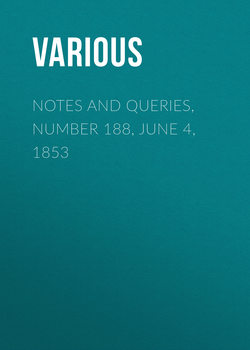Читать книгу Notes and Queries, Number 188, June 4, 1853 - Various - Страница 4
Notes
THE POEMS OF ROWLEY
ОглавлениеThe tests propounded by Mr. Keightley (Vol. vii. p. 160.) with reference to the authenticity of the poems of Rowley, namely the use of "its," and the absence of the feminine rhyme in e, furnish additional proof, if any were wanting, that Chatterton was the author of those extraordinary productions. Another test often insisted upon is the occurrence, in those poems, of borrowed thoughts—borrowed from poets of a date posterior to that of their pretended origin. Of this there is one instance which seems to have escaped the notice of Chatterton's numerous annotators. It occurs at the commencement of The Tournament, in the line,—
"The worlde bie diffraunce ys ynn orderr founde."
It will be seen that this line, a very remarkable one, has been cleverly condensed from the following passage in Pope's Windsor Forest:—
"But as the world, harmoniously confused,
Where order in variety we see;
And where, tho' all things differ, all agree."
This sentiment has been repeated by other modern writers. Pope himself has it in the Essay on Man, in this form,—
"The lights and shades, whose well-accorded strife
Gives all the strength and colour of our life."
It occurs in one of Pascal's Pensées:
"J'écrirai ici mes pensées sans ordre, et non pas peut-être dans une confusion sans dessein: C'est le véritable ordre, et qui marquera toujours mon objet par le désordre même."
Butler has it in the line,—
"For discords make the sweetest airs."
Bernardin de St. Pierre, in his Etudes de la Nature:
"C'est des contraires que résulte l'harmonie du monde."
And Burke, in nearly the same words, in his Reflections on the French Revolution:
"You had that action and counteraction, which, in the natural and in the political world, from the reciprocal struggle of discordant powers, draws out the harmony of the universe."
Nor does the sentiment belong exclusively to the moderns. I find it in Horace's twelfth Epistle:
"Nil parvum sapias, et adhuc sublimia cures,
· · · · · ·
Quid velit et possit rerum concordia discors."
Lucan, I think, has the same expression in his Pharsalia; and it forms the basis of Longinus's remark on the eloquence of Demosthenes:
"Οὐκοῦν τὴν μὲν φύσιν τῶν ἐπαναφορῶν καὶ ἀσυνδέτων πάντῃ φυλάττει τῇ συνεχεῖ μεταβολῇ· οὑτως αὐτῷ καὶ ἡ τάξις ἄτακτον, καὶ ἔμπαλιν ἡ ἀταξια ποιὰν περιλαμβάνει τάξιν."
It may be said that, as Pope adopted the thought from Horace or Lucan, so a poet of the fifteenth century (such as the supposed Rowley) might have taken it from the same sources. But a comparison of the line in The Tournament with those in Windsor Forest will show that the borrowing embraces not only the thought, but the very words in which it is expressed.
Henry H. Breen.
St. Lucia.
